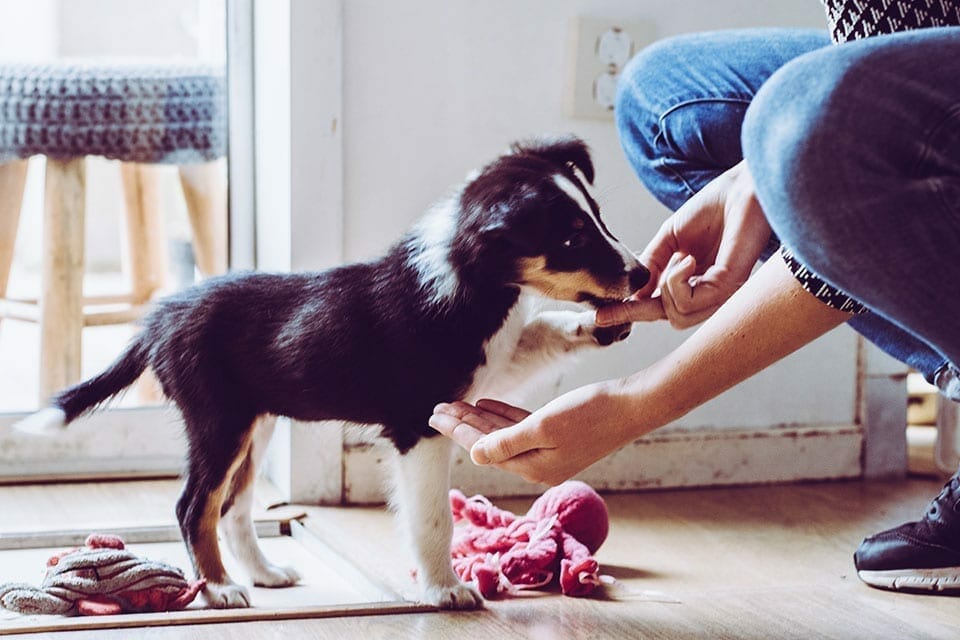
Top Tips on How to House Train a Puppy
Have you recently invited the pitter patter of puppy feet into your home? Looking for some tips on how to house train your new bundle of fur? Pet Insurance Australia investigates everything puppy, including basic training, toilet training and the importance of manners.
There is nothing quite so magical as bringing a new puppy home. This milestone event is the beginning of a possible 16 years of love, memories and pure delight. However, it is important to remember that your tiny puppy, will quickly grow into a fully-grown dog. The time and effort you put into puppy training now will ultimately provide you with the dog of your dreams or a total doggy disaster.
What is the best age to start training a puppy?
Puppy training should begin the moment your pup arrives home. Basic commands such a ‘sit’, ‘wait’, ‘drop’, ‘give’ and most importantly ‘recall or come’ should be encouraged right from the word go. It’s as simple as asking your puppy to sit before meals and wait before going through a doorway.
TOP TIPS for Basic Commands
- Sit – remember when the nose goes up the bum goes down. It’s also a good idea not to use your puppy’s name, just use the command word in a strong confident tone. “SIT”. Then praise. You can also use a hand signal for this.
- Recall or Come – puppies will instinctively come to you particularly if you run in the other direction and pat your leg. This is without a doubt the most important command in puppy obedience training. Remember big praises for the right behavior. Recall should be a very fun experience – “when I come to mum or dad it’s a good thing full of love and games”. Never recall then punish your dog or they simply will not come next time around.
- Wait – this is also an important puppy obedience training Teaching your pup to wait rather than push past you in a doorway or up-stairs can keep you both safe.
How do I potty train a puppy?
Potty training takes time and patience and some breeds will ace puppy toilet training, while others will take a little longer.
Many owners will use a crate to help with this. Having a crate or a pen area to put your puppy when you are not able to 100% supervise them can help immensely with house training a puppy. Never leave your pup locked in a crate all day and ensure you let them out regularly to toilet.
Tips for How to House Train a Puppy
- Use a crate correctly.
- Have a keyword – like “toilet time” or “quick go”. Repeat this over and over when your puppy is going to the toilet. Soon your pup will realize what you are asking of them. This particularly useful for toileting before bedtime, or when you go out.
- Watch for the signals – pups will sniff and circle before going to the toilet.
- Smaller dogs will need more toileting breaks than larger breeds.
- Take regular toilet breaks.
- Do not punish or yell at your dog for a mistake. A gentle but firm “AH AH” and quickly take your dog outside.
- Clean the area well. Do not use bleach or any products containing ammonia as this can amplify the smell to your puppy. Meaning; it might smell clean to you but scream “this is where we toilet” to your pup. Use specially designed urine cleaner or any products that contain enzymes like diluted washing powder. White vinegar also works well in eliminating smells to both you and your pup.
How do you discipline a puppy?
Like with all dogs, puppies should only be trained with positive reinforcing and praise/reward-based puppy obedience training. Harsh outdated training methods will only cause fear in your dog and may lead to issues later in life including anxiety and aggression.
Tips for Common Puppy Problems
- Chewing – puppies will chew. This is a very natural behavior. Ensure you have plenty of appropriate chew toys and rotate these daily, so your pup does not get bored with them. Never offer you pup a shoe to chew on. They cannot tell the difference between the old tennis shoe and your brand-new Italian leather lovelies. If you catch your pup chewing something that is not acceptable a quick “AH AH” in a firm and consistent tone, then give them something they are allowed to chew.
- Jumping – even though this behavior can be very cute in a little puppy, a fully-grown 45kg dog may become a danger if allowed to jump. So, it is best to ensure you train this behavior out before they get too big. Do not offer your pup any attention until they are calm and sitting down and turn your back if they jump up. Eventually your pup will realize this is not acceptable behavior. Encourage your guests to only give you puppy attention when they are sitting nicely and remember your “AH AH” in a consistent tone.
- Digging – some breeds were built to dig so always do you research before purchase to ensure you understand the traits your pup will have. Some owners believe that it is much easier to encourage digging in ‘dig appropriate zones’ rather than attempting to train the behavior out completely. Children’s paddling pools converted into sand pits work well and only encourage your pup to dig in sand not soil. Also have clear barriers around your gardens and ‘no dig zones’ and consider raised vegetable beds. Again, positive encouragement for the right behavior.
Get the latest Pet Insider Tips & News
We offer award-winning* pet insurance policies to protect your furry friend’s health and wellbeing. Get a quote today and give your pets the care they deserve.
Archives
Categories
- Cat Care (64)
- Cats (1)
- Dog Care (124)
- Guides (28)
- Health and Nutrition (200)
- Lifestyle and Activities (219)
- Media Release (24)
- Pet Care (246)
- Rescue Dogs (1)

